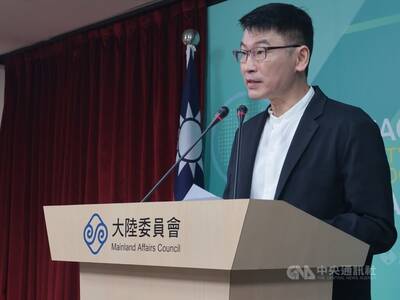Former Chinese Nationalist Party (KMT) chairman Lien Chan (連戰), in Washington to accept an International Leadership Foundation award on Thursday, called on both sides of the Strait to adhere to a five-point agreement reached in 2005, which includes signing a cross-strait peace treaty.
After receiving the award from former US secretary of labor Elaine Chao (趙小蘭), Lien said the award was for his efforts in 2005, when he visited China on an ice-breaking trip — the first time the heads of the KMT and the Chinese Communist Party (CCP) had met in six decades.
Lien told the ceremony that efforts by the Chen Shui-bian (陳水扁) government to create more international space for Taiwan at the time had led to rising tensions in the Taiwan Strait and prompted his visit to Beijing.
The ceremony was attended by Lien’s wife, Lien Fang Yu (連方瑀), Taipei Economic and Cultural Representative Office Representative Jason Yuan (袁健生) and his wife, and International Leadership Foundation chief executive Tong Chiling (董繼玲).
Meanwhile, Lien said a five-point consensus he reached with Chinese President Hu Jintao (胡錦濤) had set the foundation for governmental and non-governmental communication as well as the tone for “peaceful” development.
He called on both sides to adhere to the consensus.
The Lien-Hu meeting in 2005 saw the leaders of both political parties agree on the resumption of cross-strait negotiations as soon as possible, moves to end the state of war that existed between the two sides, the establishment of a system promoting cross-strait economic interaction, promotion and negotiation over international events and the establishment of a regular platform through which both parties would be able to communicate.
Hu and Lien are expected to meet again at the APEC leaders’ summit in Vladivostok, Russia, in September, where Lien will represent Taiwan.
Lien did not talk to reporters after the ceremony.
Additional reporting with CNA

ENDORSING TAIWAN: Honduran presidential candidate Nasry Afura said that Honduras was ‘100 times better off’ when it was allied with Taipei The Ministry of Foreign Affairs yesterday said it would explore the possibility of restoring diplomatic relations with Honduras based on the principle of maintaining national interests and dignity. The ministry made the remarks in response to reporters’ questions regarding an article titled: “Will Taiwan Regain a Diplomatic Ally?” published in The Diplomat on Saturday. The article said Honduras’ presidential election in November could offer Taiwan the chance to regain an ally, as multiple candidates have promoted re-establishing diplomatic relations with Taiwan. Honduras severed diplomatic ties with Taiwan in March 2023 in favor of Beijing, but since switching its diplomatic recognition,

A fourth public debate was held today about restarting the recently decommissioned Ma-anshan Nuclear Power Plant, ahead of a referendum on the controversial issue to be held in less than two weeks. A referendum on Aug. 23 is to ask voters if they agree that “the Ma-anshan Nuclear Power Plant should continue operations upon approval by the competent authority and confirmation that there are no safety concerns.” Anyone over 18 years of age can vote in the referendum. The vote comes just three months after its final reactor shut down, officially making Taiwan nuclear-free. Taiwan People’s Party Chairman Huang Kuo-chang (黃國昌) represented

Scoot announced yesterday that starting in October, it would increase flights between Taipei and Japan’s Narita airport and Hokkaido, and between Singapore and Taipei. The low-cost airline, a subsidiary of Singapore Airlines, also said it would launch flights to Chiang Rai in Thailand, Okinawa and Tokyo’s Haneda airport between December and March next year. Flights between Singapore and Chiang Rai would begin on Jan. 1, with five flights per week operated by an Embraer E190-E2 aircraft, Scoot said. Flights between Singapore and Okinawa would begin on Dec. 15, with three flights per week operated by Airbus A320 aircraft, the airline said. Services between Singapore

The Mainland Affairs Council (MAC) yesterday announced a ban on all current and former government officials from traveling to China to attend a military parade on Sept. 3, which Beijing is to hold to mark the 80th anniversary of the end of the Second Sino-Japanese War. "This year marks the 80th anniversary of the end of World War II and the Republic of China’s victory in the War of Resistance [Against Japan]," MAC Deputy Minister and spokesperson Liang Wen-chieh (梁文傑) told a regular news briefing in Taipei. To prevent Beijing from using the Sept. 3 military parade and related events for "united